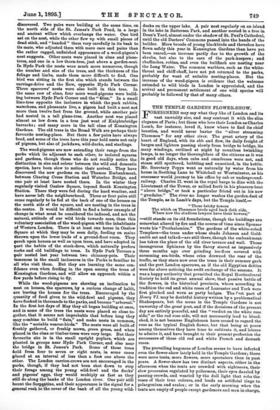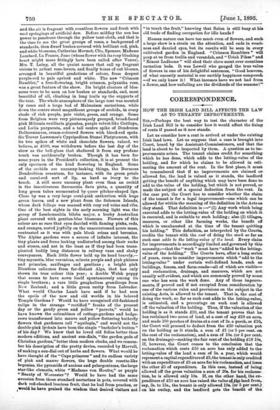THE TEMPLE GARDENS FLOWER-SHOW.
FOREIGNERS may say what they like of London and its vast unwieldy size, and may contrast it with the slim elegance of Paris ; but those who love their London as Charles Lamb, for instance, loved it, know where to find its chief beauties, and would never barter the " silver streaming Themmes " for any other river. The great artery of the heart of England, with its ebb and flow, its daily freight of barges and lighters passing slowly from bridge to bridge, its mazy windings, outlined at night by countless twinkling lamps, is no longer the thoroughfare of the citizens as it was in good old days, when cabs and omnibuses were not, and steam still sputtered, bubbling and unnoticed, in the kettle. Mr. Secretary Pepys went as naturally by water from his house in Seething Lane to Whitehall or Westminster, as his successor would journey to his office by cab or underground- railway. Charles II. went in the royal barge to dine with the Lieutenant of the Tower, or sallied forth in his pleasure-boat " above bridge," or took a particular friend out in his new " gundaloe." The river no longer washes the garden-foot of the Temple, as in Lamb's days, but the Temple itself,— "Those bricky towers
The which on Themmes brode aged back doth ride, Where now the studious lawyers have their bowers,"
—still stands on its old foundations, though the buildings are somewhat altered by fire and the course of time since Spenser wrote his "Prothalamion." The gardens of the white-robed Templars—the trees under whose shade Johnson and Gold- smith sat and talked—are still there, though the embankment has taken the place of the old river terrace and wall. Those incongruous Sphinxes by the Savoy stared as impassively three months ago over grinding ice-floes covered with screaming sea-birds, whose cries drowned the roar of the traffic, as they stare now over the trees in their summer garb and the pert London sparrows, as if the old Egyptian deities were far above noticing the swift exchange of the seasons. It was a happy authority that permitted the Royal Horticultural Society to hold its great annual show, that passive battle of the flowers, in the historical precincts, where according to tradition the red and white roses of Lancaster and York were first plucked and worn as party badges. The F rst part of Henry VI. may be doubtful history written by a problematical Shakespeare, but the scene in the Temple Gardens is not unworthy of the great poet, and if the decisions of the present day are entirely peaceful, and the "verdict on the white rose side," or the red rose side, will not necessarily lead to blood- shed, it is not because Englishmen have ceased to regard the rose as the typical English flower, but that being at peace among themselves they have time to cultivate it, and leisure to admire it, and have brought to their present perfection the successors of these old red and white French and damask roses.
The prevailing hugeness of London seems to have infected even the flower-show lately held in the Temple Gardens; there were more tents, more flowers, more spectators than in past years. A flower-show has two distinct aspects, either in the afternoon when the tents are crowded with sightseers, their slow procession regulated by policemen, their eyes dazzled by passing crowds, and wearied by the dull light that robs the roses of their true colours, and lends an artificial tinge to pelargonium and azalea ; or in the early morning when the tents are empty of people except gardeners and men in charge,
and the air is fragrant with countless flowers and fresh with cool syringings of artificial dew. Before midday the sun has power to penetrate through the yellow tent-cloth, and that is the time to see the great groups of roses, a background of standards, then dwarf bushes covered with brilliant red, pink, and white blossoms, Catherine Mermet, Clio, Spenser, Madame Lambard, La France, Juno (whose flower with its rosy blushing heart might more fittingly have been called after Venus), Mrs. T. Laing, all the quaint names that call up fragrant visions to ardent rose-lovers, and finally boxes of cut blooms, arranged in beautiful gradations of colour, from deepest purple-red to pale apricot and white. The new "Crimson Rambler," a free-flowering, bright crimson, polyantha rose, was a great feature of the show. Its bright clusters of blos- soms were to be seen on low bushes or standards, and, most beautiful of all, climbing in long trails up the supports of the tent. The whole atmosphere of the large tent was scented by roses and a large bed of Malmaison carnations, while down the centre stood magnificent groups of orchids, in every shade of rich purple, pale violet, green, and orange. Some from Belgium were very picturesquely grouped, broad-faced pink Miltonia vexillaria gigantea, purple velvet-like Cattleya, and Lmlia, purpurata, and a tall centre spike of Dendroum Dalhousianum, cream-coloured flowers with blood-red spots. Sir Trevor Lawrence's Cypripedium Stonei Platytmnum, with its two spikes of white and chocolate flowers, valued, we believe, at £800, was withdrawn before the last day of the show as the bell-glass that sheltered it from any profane touch was accidentally broken. Though it has been for some years in the President's collection, it is at present the only specimen of the kind flowering in England. Some of the orchids are uncanny-looking things, the Burmese Dendrobium cruentum, for instance, with its green petals and coral-red sort of lip, as bard as ivory to the touch. A still more uncanny plant even than an orchid is the insectivorous Sarracenia fiava pieta, a quantity of long green tubes surmounted by queer pitcher-shaped lips. Close by was a very large coral-pink anthurium with huge green leaves, and a new plant from the Solomon Islands, whose dark foliage was seamed with rosy red veins and ribs. One of the best sights in the early morning light was the group of Leschenaultia biloba major, a bushy Australian plant covered with gentian-blue blossoms. Flowers of this colour are so rare that eyes dazzled with flaming pinks, reds, and oranges, rested joyfully on the unaccustomed azure mass, contrasted as it was with pale blush ericas and boronias. The Alpine gardens were a source of infinite interest, the tiny plants and ferns looking undisturbed among their rocks and stones, and not in the least as if they had been trans- planted bodily long distances in railway vans and shaky conveyances. Each little flower held up its bead bravely,— tiny myosotis, blue veronicas, minute purple and pink phloxes and primulas, saxifrages and gentians ; a bright pink Dianthus calizonas from far-distant Alps, that has only shown its true colour this year; a double Welsh poppy that seems to have sown itself spontaneously among its single brethren ; a rare little gnaphalium grandiceps from New Zealand; and a little green rarity from Labrador. What would Charles Lamb have said if he had seen the spoils of the new and old worlds in his beloved Temple Gardens P Would he have recognised old-fashioned tulips in the strange " rectified " freaks of the present day or the gaudy green and yellow "parrots," would he have known the columbines of cottage-gardens and hedge. rows transformed into mauve and yellow flattering butterfly flowers that gardeners call " aquilegia," and would not the double-pink lychnis have been the single "bachelor's button" of his day ? We know that he loved old folios better than modern editions, and ancient sun-dials, " the garden gods of Christian gardens," better than modern clocks, and we remem- ber his description of the pretty device, recorded by Marvell, of making a sun-dial out of herbs and flowers. What would he have thought of the "Cape primrose" and its endless variety of pink and mauve flowers, the huge double rosette-like begonias, the pyramids of azaleas and pelargoniums, the large star-like clematis, white " Madame von Houtte," or purple "Beauty of Worcester"? Would he have had the same aversion from those standard nectarines in pots, covered with dark red-cheeked luscious fruit, that he had from peaches, or twould he have praised the wisdom that desired visitors not
"to touch the fruit," knowing that Satan is still busy at his old trade of finding occupation for idle hands ?
Human nature can have too ranch even of flowers, and such a large show is a strain on the attention, and ends in weari- ness and dazzled eyes, but its results will be seen in every cultivated garden in England. " Crimson Ramblers " will peep at us from trellis and verandah, and " Uriah Pikes " and " Ernest Ladhams " will shed their clove scent over countless carnation beds. It was Lowell who ganged the true value of flowers in one of his delightful sentences, "Good heavens, of what uncostly material is our earthly happiness composed, —if we only knew it ! What incomes have we not had from a flower, and how unfailing are the dividends of the seasons !"







































 Previous page
Previous page